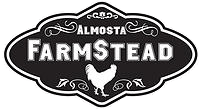






Almosta Farmstead
Ducks
We adore ducks...BUT...Are you ready for ducks?
Ducks are wonderful birds to raise for meat, eggs, insect control and they are entertaining as pets. The average lifespan of domestic ducks is 10 years.
Shopping List
Brooder Supplies: Waterer, mesh platform for water, feeder, heat lamp reflector, heat bulb, pine shavings or straw, paper towels, electrolytes and vitamins, thermometer, draft-free enclosure, coop, waterfowl starter feed, grit. For the beginner, there are chick starter kits which includes everything you need to get started.
Suggested Reading:
-
Storey’s Guide to Raising Ducks
-
The Book of Geese
At the Post Office: Promptly pick up your package and get your chicks into the prepared brooder as soon as possible.
Live Guarantee: Look for the guarantee that properly cared for birds will be alive and well for 48 hours after they arrive at your post office. Check the full policy and claim form here when ordering chicks.
Identification: Use a Duck and Goose Sexing Guide to identify the gender of your birds.
Brooder Requirements: Each baby needs 0.5 square foot of floor space. Brooder environment must be sterile and draft-free. Make sure the brooder area is big enough so that the ducklings and goslings can get away from the heat source.
Temperature: One heat lamp is enough for about 35 ducklings or 20 goslings. A thermometer is a baby bird’s best friend. Start your ducklings and goslings off at 99 degrees for the first three hours. Then 95 degrees the first week. Reduce by 5 degrees each week until around 6 weeks of age and 70 degrees. They can begin exploring outside for short periods during the day as they begin to grow. Once they are fully feathered out at about 7-9 weeks they can stay outdoors all day, but be sure to provide shelter from the sun and rain.
Water: As soon as you get your birds into the brooder, immediately dip their beaks in water. Make sure they are tipping their heads back to drink. Ducklings, especially Mallards, Calls, and Muscovies dehydrate much sooner than other poultry. For these breeds to prevent over consumption that results in waterlogging and death, provide water for 15 minutes, remove it for 10-15 minutes and then return the water to them. Repeat 2-3 times the first day only.
Birds need to have access to drinking water at all times. Use a 1 gallon waterer for each 35 birds. Initially, water levels should be minimal to avoid drowning; clean marbles in the dish will help. Warm water for the first few hours is beneficial. On the third day, include vitamin or electrolyte powder in the water. Place the waterer atop a plastic or wire mesh platform that the water can fall through, to keep the water clean and their bedding dry.
Swimming Water: Ducklings and goslings from a hatchery do not have oil on their feathers as those who get oil from their brooding mothers. They are easily waterlogged and chilled when placed in swimming water at an early age. As early as 1 week they can be very closely supervised in shallow warm water. They need to be able to walk in and out on their own to find their heat lamp easily. Early exposure to water helps to speed the development of their oil glands and they will be swimming on their own by 5 or 6 weeks.
Feed: Waterfowl feed is best. If you cannot find a waterfowl starter feed, use 21% protein chicken starter crumble up to two weeks of age. 17% protein pellet feed should be fed after that.
Litter: The best option for bedding material is 2 inches of large size kiln dried pine shavings. Use paper towels above the shavings for the first few days. Do not use sawdust or cedar shavings. Bedding must be changed regularly and kept clean and dry.
Angel Wing: A condition in ducks and geese where the last joint of their wing feathers is twisted and points away from their body. Causes may include high protein, high carbs, or lack of exercise. Feeding excessive carbohydrates such as bread, popcorn, corn is a leading cause. Human food is not recommended.
Twisted Wing: All geese can get twisted wing that is caused by too much protein and not enough room to exercise. Decrease protein levels and increase living space to alleviate this problem.
Coop and Run Considerations: When housing your ducks only at night to avoid nocturnal predators, provide 4 square feet per duck. If the ducks do not free range during the day, the run should provide 12 square feet for ducks. If you keep ducks inside continuously during severe weather, provide ducks with 12 square feet of floor space. Provide half that amount for bantam breeds. Covered nest boxes must be provided for Muscovy ducks. For geese, provide 10 square feet of indoor space and 40 square feet of outdoor space.
Safe Handling of Poultry: After handling poultry, wash your hands with soap and warm water. Do not let young children, elderly persons, or people with weak immune systems handle or touch live poultry. Do not snuggle or kiss your birds. You can get Salmonella from touching live fowl. Your birds can carry Salmonella and still appear healthy and clean. Regularly clean your poultry equipment.
